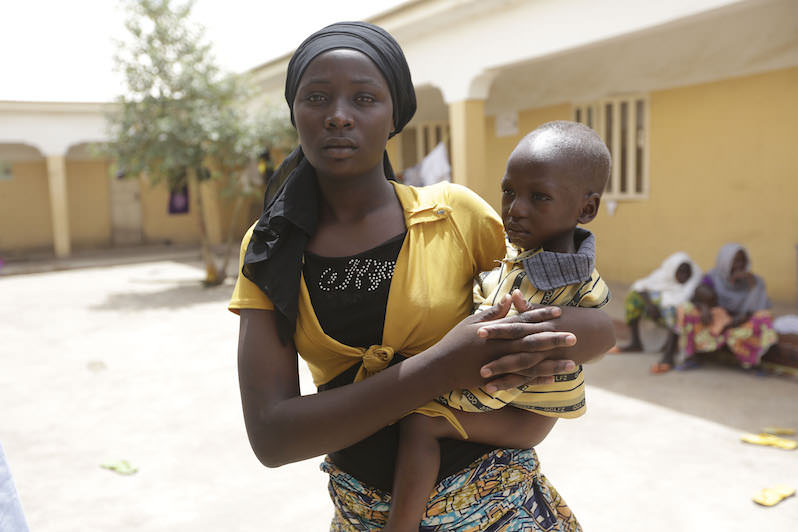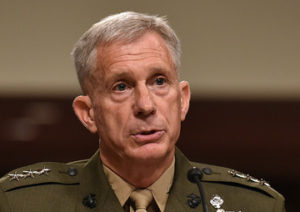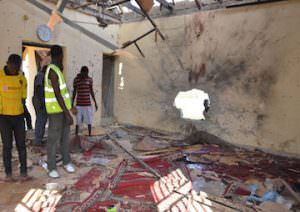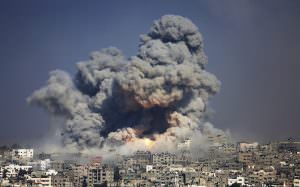The Abduction of the Chibok Schoolgirls Was Only the Iceberg’s Tip
The rescue of hundreds of captives in Nigeria shows that the scale of kidnappings by the terrorist group Boko Haram has been grossly underestimated. Binta Ibrahim at a refugee camp in Yola, Nigeria, on May 4 after Nigerian soldiers rescued her in the Sambisa Forest. (AP / Sunday Alamba)
Binta Ibrahim at a refugee camp in Yola, Nigeria, on May 4 after Nigerian soldiers rescued her in the Sambisa Forest. (AP / Sunday Alamba)
What in the world — or rather, what in Nigeria — is really going on?
Over a year ago, reports lamented the kidnapping of over 200 schoolgirls from Nigeria’s northern town of Chibok.
Activists created the hashtag #BringBackOurGirls to trigger global awareness and push the Nigerian army to bring the Chibok schoolgirls back.
The people of Nigeria wailed at the sheer magnitude of the abduction, and experts explained that the loss of such a huge number of citizens and the phenomenon of terrorism itself were rare for the advanced African nation.
Additionally, many assumed that the capture of the Chibok 276 schoolgirls by Boko Haram was, and would be, the largest-ever instance of terrorism run amok in the African giant, Nigeria.
That assumption was wrong, if the latest rescue reports from Nigeria are true. The damage from terrorism in Nigeria is much greater than once estimated. In the past two weeks alone, some 700 children and women have been rescued, “as soldiers supported by air raids” deployed on foot into a Boko Haram stronghold, the Sambisa Forest, according to Al-Jazeera.
In addition to these 700 women and children who were rescued last week, 293 girls were rescued the week before, Al-Jazeera noted.
In other words, there were, and could actually still be, more children and women held by Boko Haram than the initial Chibok schoolgirls (who, by the way, have not been found).
Here we all were, indignant! Angered! Incensed … by the unimaginable loss of some 276 Chibok schoolgirls last year, only to now hear of a much bigger and more sinister cancer eating away at the north.
The idea that Boko Haram had captured the Chibok girls was mind-blowing enough, but now we come to discover that what we assumed was an impossible scale of abduction is even larger.
A staggering thousands more than the 276 schoolgirls have been captured by Boko Haram; the terrorist group has seized at least 2,000 women and girls, according to Amnesty International, and some 1.5 million people have been displaced from their homes amid the attacks.
To make matters downright vicious and enraging, many of the girls who were rescued by the Nigerian army in recent weeks were “discovered to be at various stages of pregnancies, some visibly pregnant and some just tested pregnant,” a United Nations official said.
Nigeria is undergoing an unprecedented rape of land and child.
The country has not only lost control of its borders, but has lost that control at the cost of its people’s lives, which by definition means that it is at war. Do we congratulate the Nigerian army (and the paid foreign military contractors summoned to support the army) for rescuing these women and children, who have been abducted for over a year, raped repeatedly and beaten? (Some were stoned to death once Boko Haram discovered the Nigerian army would try to save them.)
Or do we ask how in the world — or rather, how in Nigeria — were thousands, not hundreds, of victims conceivably held captive for such a long period, on the government’s watch, in the first place?The Nigerian army, as well as courageous reports like Kaj Larsen’s story on “Vice News,” might suggest that Boko Haram is being stamped out for good, especially now that some bordering African nations have joined the fight and a more aggressive emphasis has been placed on the task. The newly elected president of Nigeria, Muhammad Buhari, to whom sitting President Goodluck Jonathan lost an election after a failure to recover the Chibok girls, has also promised as much. However, one cannot quite be sure.
Over the course of the last half decade, Boko Haram established bona fide camps in a northern area so dense and remote, the Sambisa Forest, that their terroristic lives were successfully separated from rest of the country.
And, though Boko Haram’s members have claimed smaller attacks in Nigerian cities, they are still a somewhat abstract phenomenon to the average city dweller in Lagos (in a southern region), for example, whose concerns have much more to do with getting good cellphone service and finding a good job than the lurking terror cells up north.
Therefore, the north and the south of Nigeria are two different worlds in the same country. This means that there was — and could still be — room for ungoverned, illegal activity in the north, including arms smuggled to Boko Haram so it can regroup; the operation of training camps by Boko Haram; nearby men, women and children being trained to kill; and whatever the group’s newfound allegiance to ISIS may bring.
Terrorism in Nigeria, seemingly confined to the north, is apparently vicious. All along, Boko Haram had been building its very own nation in the northern part of the country.
The historical implications are deeply worrisome. It’s no longer just about how the Nigerian government was inept in handling this issue; it’s that the government was possibly just as cruel in its negligence for all these years as Boko Haram has been in its massacres. In fact, the Nigerian army was reported to have abused human rights in its initial attempts to stamp out Boko Haram prior to the global cry for help in Chibok. Additionally, it was ill-equipped and ill-prepared, which served as a point of weakness that was thoroughly exploited by the terrorists.
Now that the Nigerian government is rescuing the missing and attempting to fix a problem that never should have occurred in a country of such stature, some may choose to applaud — but still, nobody wins.
Your support matters…Independent journalism is under threat and overshadowed by heavily funded mainstream media.
You can help level the playing field. Become a member.
Your tax-deductible contribution keeps us digging beneath the headlines to give you thought-provoking, investigative reporting and analysis that unearths what's really happening- without compromise.
Give today to support our courageous, independent journalists.




You need to be a supporter to comment.
There are currently no responses to this article.
Be the first to respond.